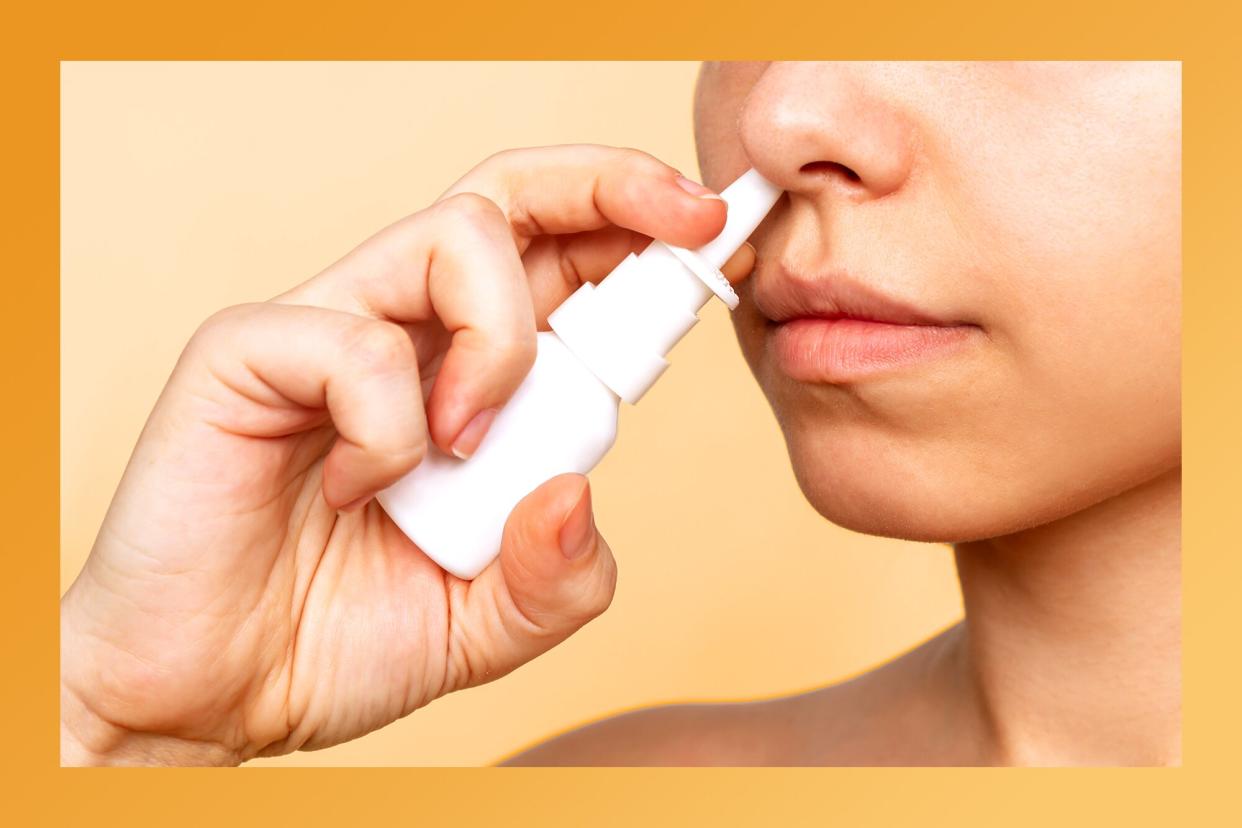Are the Tanning Nasal Sprays All Over TikTok Safe?

Getty Images
Plenty of TikTok beauty trends have emerged over the years that are questionable, to say the least. So, when a weird-sounding new product pops up, it's more than fair to approach it with some level of doubt.
Enter: self-tanning nasal sprays. TikTok is packed with posts featuring people squirting these specialized sprays up their noses in pursuit of a tan.
The way it's supposed to work is simple: You breathe in a few squirts up your nose and then exposure yourself to UV rays, either directly from the sun or in a tanning bed, with the goal of getting a deeper, longer-lasting tan than you would otherwise.
There are several brands out there that claim to help enhance your tan with a nasal spray, including 2bTanned, Permatan, and XTremeTan, and sprays can cost you upwards of $200 a pop. But is this legitimate? More importantly, is it safe? Here's what experts have to say. (Related: 13 Self-Tanning Lotions That Will Give You a Healthy Glow, According to Thousands of Reviewers)
What's in these nasal tanning sprays?
That's a great question! These sprays aren't tightly regulated by the Food and Drug Administration (FDA). With that, companies aren't legally obligated to share their ingredients with you, so you don't know exactly what's in them.
However, some brands have noted that their sprays contain L-tyrosine, tyrosinase, dihydroxy methylchromonyl palmitate, or melanotan. Permatan shares its ingredients list online, which includes water, dihydroxy methylchromonyl palmitate, L-tyrosine, and "natural flavors."
How might a nasal spray work enhance your ability to get a tan?
It's really hard to say, but there is some science behind why these might work in theory, says board-certified dermatologist Ife J. Rodney, M.D., founding director of Eternal Dermatology Aesthetics and professor of dermatology at Howard University and George Washington University.
"L-tyrosine is a precursor to melanin, and that's what puts pigment in your skin," she explains. "Having increased levels of L-tyrosine in your skin can lead to darker skin."
Melanotan "is a protein that mimics a natural hormone in our bodies known as melanocyte stimulating hormone," explains Joshua Zeichner, M.D., director of Cosmetic and Clinical Research in Dermatology at Mount Sinai Hospital. "The peptide tells our skin cells to rev up pigment production, leading to skin darkening," he adds.
Finally, dihydroxy methylchromonyl palmitate "stimulates melanin production," says Dr. Rodney. (Noticing a pattern?) But — and this is a big caveat — Dr. Rodney points out that all three of these ingredients "are meant to be used topically," i.e. not snorted up your nose.
When you spray something up your nose, it's absorbed systemically (meaning: it can go all over your body). With that, snorting an ingredient through your nose that isn't intended or approved by federal regulators for that use is risky, notes Dr. Rodney. (Related: 10 Self-Tanners for Your Face That Will Give You a Just-Back-from-the-Beach Glow)
Absorbing the sprays through your nose "may increase the skin's ability to take up UV rays and tan," but "there's no scientific data to suggest that these ingredients would even be absorbed through the nasal cavity," says Gary Goldenberg, M.D., founder of Goldenberg Dermatology.
Is it safe to use a nasal tanning spray?
As you might've already gathered, experts aren't get behind this one. Since the sprays are regulated by the FDA as cosmetics, the agency places the burden on the companies themselves to ensure they're safe. "We just don't know enough about them to say they are safe," says Alan. Even if the sprays contain the ingredients the companies claim they do, it's still risky. "Tyrosine is the precursor for substances in our body like epinephrine (aka adrenaline)," says Alan. "These sprays can cause nasal discharge, sinus headaches, high blood pressure, nausea, vomiting, and who knows what else."
It's a "terrible idea" to go this route to get a tan, says Dr. Rodney. "These sprays can be harmful and irritating to the skin of your nose," she says. "We also really don't know what the risks are with ingesting these in this manner and if it's even effective."
Another major red flag, the sprays are designed to be used before you have unprotected exposure to the sun. "Even short exposure to UV increases the risk of skin cancer, sun damage, wrinkles and lines, and pigmentation," says Dr. Goldenberg. (Related: The Best Sunscreens Tested and Approved By Shape Editors)
How to tan safely
If you want to get tanned skin, dermatologists recommend using a self-tanning spray or cream. "They give you a more tanned color to your skin but don't actually make your skin increase the production of melanin," says Dr. Rodney.
Dr. Goldenberg agrees. "The only safe tan is a spray tan or a cream self-tanner," he says. "Unprotected exposure to UV is never safe."

